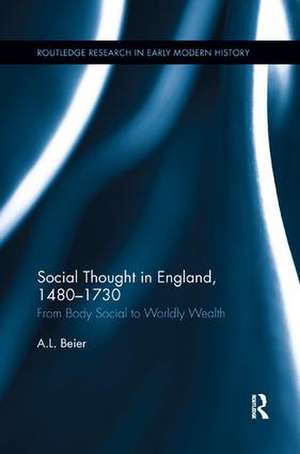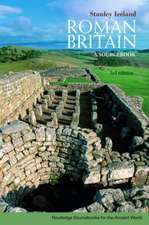Social Thought in England, 1480-1730: From Body Social to Worldly Wealth: Routledge Research in Early Modern History
Autor A. L. Beieren Limba Engleză Paperback – 17 noi 2017
| Toate formatele și edițiile | Preț | Express |
|---|---|---|
| Paperback (1) | 442.50 lei 6-8 săpt. | |
| Taylor & Francis – 17 noi 2017 | 442.50 lei 6-8 săpt. | |
| Hardback (1) | 957.67 lei 6-8 săpt. | |
| Taylor & Francis – 19 feb 2016 | 957.67 lei 6-8 săpt. |
Din seria Routledge Research in Early Modern History
-
 Preț: 326.55 lei
Preț: 326.55 lei -
 Preț: 377.28 lei
Preț: 377.28 lei -
 Preț: 303.80 lei
Preț: 303.80 lei -
 Preț: 313.91 lei
Preț: 313.91 lei -
 Preț: 312.56 lei
Preț: 312.56 lei -
 Preț: 324.64 lei
Preț: 324.64 lei -
 Preț: 311.14 lei
Preț: 311.14 lei -
 Preț: 326.49 lei
Preț: 326.49 lei -
 Preț: 305.71 lei
Preț: 305.71 lei -
 Preț: 314.44 lei
Preț: 314.44 lei - 9%
 Preț: 1004.63 lei
Preț: 1004.63 lei -
 Preț: 325.72 lei
Preț: 325.72 lei -
 Preț: 311.43 lei
Preț: 311.43 lei -
 Preț: 310.22 lei
Preț: 310.22 lei -
 Preț: 309.60 lei
Preț: 309.60 lei -
 Preț: 310.56 lei
Preț: 310.56 lei -
 Preț: 326.49 lei
Preț: 326.49 lei - 18%
 Preț: 998.71 lei
Preț: 998.71 lei -
 Preț: 416.22 lei
Preț: 416.22 lei - 31%
 Preț: 765.84 lei
Preț: 765.84 lei - 31%
 Preț: 763.81 lei
Preț: 763.81 lei -
 Preț: 382.47 lei
Preț: 382.47 lei -
 Preț: 416.09 lei
Preț: 416.09 lei - 31%
 Preț: 764.62 lei
Preț: 764.62 lei - 18%
 Preț: 995.54 lei
Preț: 995.54 lei - 18%
 Preț: 1000.27 lei
Preț: 1000.27 lei -
 Preț: 392.67 lei
Preț: 392.67 lei - 31%
 Preț: 765.43 lei
Preț: 765.43 lei - 30%
 Preț: 769.11 lei
Preț: 769.11 lei - 18%
 Preț: 1057.13 lei
Preț: 1057.13 lei - 28%
 Preț: 655.70 lei
Preț: 655.70 lei - 18%
 Preț: 1000.27 lei
Preț: 1000.27 lei - 18%
 Preț: 1060.25 lei
Preț: 1060.25 lei - 31%
 Preț: 678.69 lei
Preț: 678.69 lei - 18%
 Preț: 1054.71 lei
Preț: 1054.71 lei - 18%
 Preț: 1001.07 lei
Preț: 1001.07 lei - 30%
 Preț: 819.32 lei
Preț: 819.32 lei - 31%
 Preț: 763.81 lei
Preț: 763.81 lei - 30%
 Preț: 847.31 lei
Preț: 847.31 lei -
 Preț: 382.36 lei
Preț: 382.36 lei - 31%
 Preț: 764.20 lei
Preț: 764.20 lei - 19%
 Preț: 279.31 lei
Preț: 279.31 lei
Preț: 442.50 lei
Nou
Puncte Express: 664
Preț estimativ în valută:
84.67€ • 88.41$ • 69.92£
84.67€ • 88.41$ • 69.92£
Carte tipărită la comandă
Livrare economică 15-29 aprilie
Preluare comenzi: 021 569.72.76
Specificații
ISBN-13: 9780815381457
ISBN-10: 081538145X
Pagini: 484
Ilustrații: 7 Halftones, black and white; 5 Tables, black and white; 7 Illustrations, black and white
Dimensiuni: 152 x 229 x 25 mm
Greutate: 0.45 kg
Ediția:1
Editura: Taylor & Francis
Colecția Routledge
Seria Routledge Research in Early Modern History
Locul publicării:Oxford, United Kingdom
ISBN-10: 081538145X
Pagini: 484
Ilustrații: 7 Halftones, black and white; 5 Tables, black and white; 7 Illustrations, black and white
Dimensiuni: 152 x 229 x 25 mm
Greutate: 0.45 kg
Ediția:1
Editura: Taylor & Francis
Colecția Routledge
Seria Routledge Research in Early Modern History
Locul publicării:Oxford, United Kingdom
Public țintă
Postgraduate and UndergraduateCuprins
Part I: The Body Social, 1480–1550 1. The Body Imagined 2. Contexts and Conflicts 3. The Body Examined: Ancient, Medieval, Modern 4. Different Metaphor, Similar Message: Edmund Dudley’s "Tree of Commonwealth," 1509-1510 5. The Body Historicized: Clement Armstrong, 1529-1536 6. Defending the Body: "Commonwealth-Men," c. 1520–c. 1553 Part II: Social Humanist Challenges to the Body Social, 1516-1549 7. Moving Away from the Body: An Overview 8. Poverty, Wealth, and Labor: New Theory, New Practices 9. A Radical Re-Ordering: Thomas More’s Utopia, 1516 10. Social Humanist Thought Re-Defines the Social, c. 1523/5-1536. 11. Rethinking the Three Estates: Thomas Starkey’s "Dialogue Between Lupset and Pole," 1529-1532 12. Virtue Meets Profit: The Brave New World of Sir Thomas Smith, 1549 Part III: Society as Property, 1550-1697 13. Re-Drawing the Social Picture, 1550-1600 14. Property, Patriarchy, and the Agrarian Problem, 1593-1656 15. The Power of Property Perceived, 1576-1730 16. Property Assailed and Defended: Grandees, Levellers, and Diggers: 1647-1649 17. Conclusions: The Past Makes the Future
Recenzii
"Summing Up: Recommended."
--M. E. Wiesner-Hanks, University of Wisconsin--Milwaukee, in CHOICE
--M. E. Wiesner-Hanks, University of Wisconsin--Milwaukee, in CHOICE
Descriere
This book argues that social concepts most definitely existed in late medieval and early modern England, laying the foundations for modern models of society. It analyzes social paradigms and how they changed in the period. The middle ages imagined society as a body whose members were interdependent, unchanging, hierarchical, and which rejected wealth and embraced poverty. Early modern thinkers challenged the body theory, developing a social humanist model affirming competition, mobility, and wealth.
















